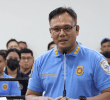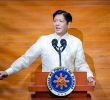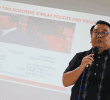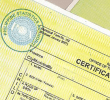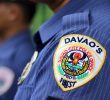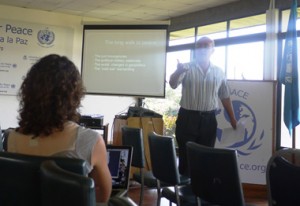
OPTIMISTIC. In this file photo, Professor and Vice Rector Dr. Victor Valle gives lecture on the Maras gang at the University for Peace in San Jose, Costa Rica. He acknowledged that the death of Venezuelan leader Hugo Chavez will have policy impacts but remained positive that “Chavez took the measures to guarantee that after his death some of the institutions and programs that he promoted and supported will be maintained.” (davaotoday.com photo by Louise G. Dumas)
Interviewed by Davao Today, Latin Americans and Filipinos were one to say that Chavez left a lasting impact in Venezuela and the rest of the world.
By LOUISE G. DUMAS
Davao Today
(The writer is currently taking her Master’s degree on Media, Peace and Conflict Studies at the University for Peace in Costa Rica)
SAN JOSE, Costa Rica, Central America — As the funeral of President Hugo Chavez is set in Caracas, Venezuela at 11 AM Friday (11 PM in the Philippines) members of the academe from the United Nations-mandated University for Peace were divided as to how history should truly judge the late Comandante.
Interviewed by Davao Today, Latin Americans and Filipinos were one to say that Chavez left a lasting impact in Venezuela and the rest of the world.
While acknowledging that the death of Chavez will have policy impacts, University for Peace Professor and Vice rector Dr. Victor Valle is optimistic that the economic and social cooperation among the Latin American countries will be sustained long after Chavez supported them.
“The end of a charismatic leader is causing a great impact not only in Venezuela but also to Latin America, in fact to the rest of the world,” he said. “But I think Chavez took the measures to guarantee that after his death some of the institutions and programs that he promoted and supported will be maintained,’ he added.
“One of the main efforts that Chavez did in order to counterbalance the influence of the US and the Organization of American States was the establishment of Alianza Bolivariana para los Pueblos de Nuestra América (Alba). They have taken measures to establish programs for the benefit of the member countries and for some societies in countries that are not members of Alba but who have some strong links with the Venezuelan government,” Valle said.
Citing the case of El Salvador, he said that the El Salvadorean society, especially NGOs, receive benefits for socio-economic projects. “I hope that those programs and projects will remain,” he said.
Hurt some
But for a kin of a prisoner under the Chavez government, the late President was an “autocrat” albeit “a great politician” and a “Robin Hood.”
“They [the government] have been creating this mythological image of Chavez, sacred, almost god-like,” Tomás Chang Pico, a Venezuelan lawyer and currently a student of the International Law and the Settlement of Disputes programme, told davaotoday.com.
“I felt a bit bad because Chavez is now gone not because he lost power but because he died,” he said.
Chang’s hatred towards Chavez was known to his classmates and peers. His uncle, Herman Sifontes, was arrested and detained for more than two years after the Chavez government passed a law against illegal foreign exchange and closed down Econoinvest, a pioneer brokerage firm where he worked as a director.
Venezuelan publication El Universal estimates the ban affected 63 brokerage firms, 60 commission houses and around 5,000 employees.
“When I was in Venezuela, I felt excluded. Because that was how it was. It was either you were with Chavez, or you are an opponent,” Chang shared.
“Chavez started fine. He had an image of a serious politician who wanted to reconstruct Venezuela from the eroded economy in the late ‘90s,” he added.
But then, he said, Chavez wanted more power and intervened into the various government institutions. “The law of the land was what Chavez says,” he said.
He recognized, though, that Chavez “was a great politician” who “knew how to connect with the poor and to them he was a Robin Hood.”
“What we then had was a perfect autocracy, always legitimized by popular votes. Courts, governmental institutions and security agencies were turned into weapons against his opponents,” Chang said.
Human Rights activist from Thailand and a student of International Law and Human Rights in the university, Pimsiri Mook Petchnamrob, pointed out the alleged human rights violations committed by the Chavez government.
“He was a great guy but he could not withstand criticism,” she said. “His policies are very interesting. He is semi-authoritarian but he knows how to play with democracies which is why it was not easy for US to overthrow him,” she added.
For Petchnamrob, Chavez seeming bias towards the poor and against the middle class violates human rights.
“These [human rights] are part of neoliberal policies. I am not sure if Chavez could be a democratic leader and still be able to implement his programs. Because there would be a lot of resistance from middle and upper classes against the health care and educational systems that he implemented,” she said.
Marvelous Misolas, a Filipina Maryknoll sister, who is now studying Environmental Security and Peace, expressed her condolence with the people who are grieving the death of Chavez.
“I am in solidarity with the masses who really thought that they were helped by Hugo Chavez and who enabled them to horizontally share the nation’s wealth,” she said.
Helped many
“The fact that Venezuela is an oil-producing country, even if it is not one of the biggest economies in Latin America, makes them important even to the rest of the world. This is also what the conservatives are thinking – that it will affect Cuba, Nicaragua, Bolivia,” Valle said.
Valle said that countries and political establishments have taken measures to maintain stability not only in terms of oil but also in the social exchange that they have built up. “I think the relationship between Venezuela and the other Alba’s countries – Cuba, Bolivia, Nicaragua and the small state islands in the Caribbean – will remain,” he said.
Aware of the financial aid that Venezuela had been extending to other Latin American countries, Misolas said she was wary of these “diplomacy tactics.”
“It’s money diplomacy. To buy allies, to stop criticism. But then again, it is not only him who does it. China does it, even Taiwan does it. Certainly, the United States does it,” she argued.
Life after Hugo
“Chavez was seen as the bearer of political stability in the country,” Chang said. “His followers are now torn between Diosdado Cabello and Maduro. Chavez was the unifying pillar and Chavisimo without Chavez will be put to test in the coming months,” he added.
“I think there are several lessons that Chavez left to the next generation. One of them is that poor people count. These people were very marginalized that’s why he gave them voice. More importantly, as what we have seen in the repressions under Chavez, participatory processes are needed for the wellness of the public,” he added.
Beyond Venezuela, the Latin American region and in fact the rest of the world that had been following the 14-year rule of Chavez — is faced with one grave question: what will now happen to the Alba that Chavez had resolutely put together?
Anita Zambrana Gamarra, a lawyer from Bolivia and student of International Peace Studies, expressed that the future of their country will largely be determined with how the Venezuelan landscape shifts after Chavez.
“He was our main supporter –politically, economically, socially,” she said. “We are trying to go socialist. We needed some back up and we had Cuba and Venezuela. Ecuador and Bolivia are going the same way as them,” she added.
However, she said that Venezuela’s future is not certain at all.
“We get so many things from Venezuela – agricultural support, education. We have been nationalizing our companies because of Venezuela’s support. We just kicked out Spain. If Cuba and Venezuela change their regime, I don’t know if we can do it ourselves. As a Bolivian I am really worried. I watched last year’s elections like it was ours,” she said.
Valle is positive that Chavez’ successor will continue the late president’s good deeds.
“After seeing the reaction of the Venezuelans, I presume that Maduro will win (the foreseen presidential elections). The momentum will be for his benefit, who is the person designated by Chavez before he left for Cuba in December. Maduro will have a different style, a different approach, and will have different alliances. But the substantial characteristics of the projects started under Chavez will remain,” he said.
Valle had been involved in the Frente Farabundo Martí para la Liberación Nacional- Frente Democratico Revolucionario alliance political-diplomatic activities during the civil war and the negotiations that ended the conflict in 1992 in El Salvador. He had also served as the Secretary-General of the National Revolutionary Movement, political party member of the Socialist International and was a founding member of the National Commission for Consolidation for Peace, in charge of verifying the fulfillment of the UN mediated Peace Accords in El Salvador. (Louise G. Dumas/davaotoday.com)

